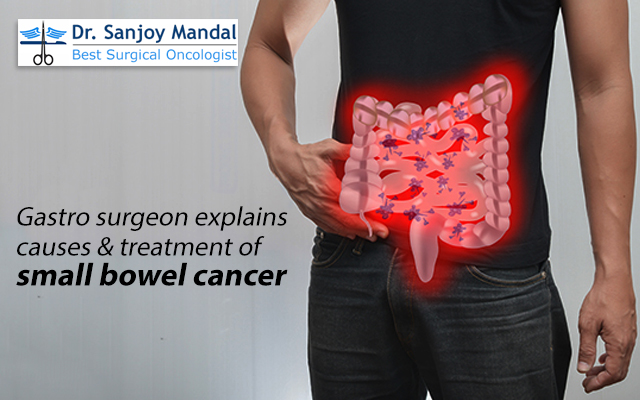Small bowel cancer develops when cancerous cells grows in the small intestine. Small intestine is a part of the GI tract, hence small bowel cancer can also spread to other parts of the gastrointestinal tract including the esophagus, stomach and large intestine, said the best gastro surgeon in Kolkata.
In most cases, small bowel cancer develops either in the duodenum or the ileum.
Causes and Symptoms of small bowel cancer: Explains gastro surgeon
Small bowel cancer forms when cells in the DNA change due to genetic mutation and grow out of control. Gradually the cancerous cells also affect the surrounding healthy tissues and spread to the other parts of the body.
A well-known GI surgeon in Kolkata said that the exact cause of the small bowel cancer is still not completely known, and research is going on. However, there are risk factors which might increase your chance of developing this type of cancer.
- Age, especially if you are above 65 years.
- Inherited genetic conditions like familial adenomatous polyposis (FAP), Peutz-Jeghers syndrome, hereditary nonpolyposis colorectal cancer (HNPCC) and Lynch syndrome.
- Autoimmune disorders like HIV, Crohn’s disease, and Celiac disease.
- Chronic inflammatory diseases.
Studies have also proved that too much tobacco and alcohol consumption can increase your risk of small bowel cancer.
According to the opinion of the best cancer doctor, patients with small bowel cancer usually experience these symptoms.
- Lump in the abdomen
- Severe pain and cramps in the abdomen
- Sudden weight loss
- Nausea and vomiting
- Black stool sometimes accompanied by blood
- Skin flushing near the face, neck and upper chest.
Is there any treatment for small bowel cancer? Answers gastro surgeon
Symptoms of small bowel cancer vary depending upon the type and severity of the tumour. So whenever you consult a GI surgeon, your doctor will ask you about your health conditions and conduct blood tests and imaging tests like endoscopy, CT scan and X-rays to identify the severity of your cancer.
The treatment you will be given will depend upon the stage of your cancer
- Surgery
If small portion of your intestine gets affected, your cancer doctor will remove the part of the intestine that contains cancer and rejoin the cut ends of the intestine.
- Chemotherapy
During this treatment, your doctor will use strong chemical drugs to destroy the cancer cells. Your doctor may also suggest chemotherapy to kill the remaining cancer cells
- Radiation
Radiation therapy is prescribed when surgical methods fail to remove the cancer cells. This therapy uses high energy X-rays to kill the cancer and prevent them from growing.
Conclusion
If you are diagnosed with small bowel cancer, don’t panic. Early detection will help the doctors find the best possible treatment options depending upon the stage of your cancer.
Patient review
Here is one patient sharing his experience
“He’s simply the best.
My uncle and aunt are under his care.Impeccable surgeon. Fantastic and fast diagnosis detection.Sir is amazing. Also he is one of the kindest doctors I have ever come across. His calming presence provides confidence to his patients. Wish you all the very best for all your future endeavours.”
